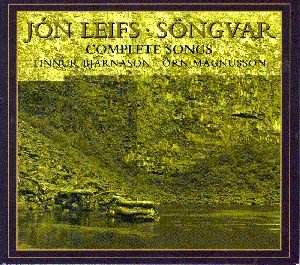This
Icelandic Music Centre-sponsored set presents an unusual dimension
to a composer we associate with angular and volcanic orchestral
statements.
The
two discs make available a treasury of songs set and sung in Icelandic.
They are tragic, restive, angry, volatile, imploring and generally
not often in touch with the more yielding emotions. This set will
force another reassessment of Iceland's most famous composer.
The
two discs play for circa forty minutes each. The Op. 45 Memorial
Songs (Hallgrimsson) tend towards the darker dissonances and
melodic contours of the orchestral works as does Stand House
of Stone Op. 47 a (CD1 tr.14). The last of the three is all
prayer and pleading invocation. The Op. 25 Saga Symphony Songs
are brutally heroic, broad-chested magnificence with rough-cut
strength to the fore. The violent stone mace blows of Thormodur's
Death (tr.6 CD1) are startlingly vicious as also in Fjord
of a Thousand Islands (tr.8 CD1). The Op. 24 Three Songs
from the Icelandic Sagas are also declamatory - much as Alan
Bush's Voices of the Prophets - sometimes thunderously
so. These songs acted as character sketches for the Saga Symphony
(Bis). The Icelandic Folk songs of Op. 19b are, in
the case of Slumber Dearest Child of Mine (tr.7 CD1) and
Good Night (tr.9 CD1), enigmatically both hopeless and
comforting. The named folk settings owe much to his collecting
expeditions to Iceland between 1926 and 1934. As early as 1924
Leifs four-square defiant awkward-cussedness is in evidence in
the laconic and often protesting songs of Three verses from
Havamal. The Pierrot shadow garden ambience of the Two
Songs Op. 14a can be cut with a knife. Softer emotions emerge
for Verse in the Op. 23 set (CD2 tr.4). But a sinister
ombrageous atmosphere is pervasive in Dance of the Spectres
Op. 23 (CD2 tr.5). The sort of sturdily patriotic effusiveness
we find in the songs of Alfvén and Peterson-Berger can
be heard in Memory-Land (tr.7 CD2) sung here with stentorian
fervour. Then, in complete contrast, comes Long is one Night,
a starrily magical love song from Op. 18b (CD2 tr. 8). The second
of the two love songs (Op18b No. 2 at tr.9 CD2) is more closely
connected to Leifs’ trademark declamatory stream. The early Op.
12a hymns, playing to the more devotional side, are invocatory
and pleading and it is only in the last one, Arise my soul,
that the angular side of Leifs style colours the music. The last
song on CD2 is Torrek, Op. 33a from 1947. This is a setting
of an episode from Egil's Saga. It is uncompromising, defiant
and sulphurous and has all the unpredictable volatility of a geysir
though ending exhausted, submissive.
The
songs are opulently spread across two CDs. This was an unnecessary
extravagance. There are plenty of examples of discs that exceed
the 80 minute playing time 'barrier'.
The
two discs are housed in a robust double flap card case. The indispensable
essay by Árni Heimir Ingólfsson is in Icelandic
and English. The texts are given in the sung Icelandic with parallel
English translations.
Many
of these are world premiere recordings.
Rob
Barnett
